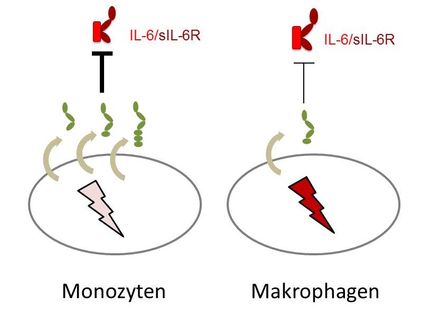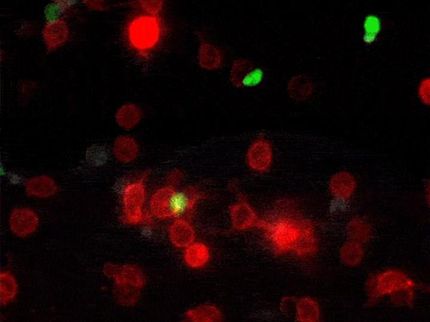Protein found to be key in protecting the gut from infection
A signaling protein that is key in orchestrating the body's overall immune response has an important localized role in fighting bacterial infection and inflammation in the intestinal tract, according to a study by UC San Diego School of medicine investigators, published in the journal Cell Host and Microbe.
Martin Kagnoff, MD, UCSD Professor Emeritus of Medicine and Pediatrics, who led the study, says his team's findings suggest that diminished levels of granulocyte-macrophage colony-stimulating factor (GM-CSF) is potentially an underlying factor in the severe illness caused by pathogens such as E. coli , and inflammation of the intestine by diseases such as Crohn's disease. These findings shed light on the apparent benefits of GM-CSF administration to some patients with Crohn's, which have been observed but not clearly understood. Kagnoff is also Director of Laboratory of Mucosal Immunology and the Wm. K. Warren Medical Research Center for Celiac Disease at UC San Diego.
GM-CSF is important for the survival and function of dendritic cells, immune cells that are the body's foot soldiers against certain diseases. Dendritic cell levels are normally elevated when the body is exposed to infection. GM-CSF serves a rapid-response role when the body is attacked by molecular agents – activating dendritic cells, pumping up their numbers, and signaling them to the target site of infection, where they orchestrate a defense against the invading pathogen. This response is sustained until the pathogens are cleared from the body.
"The gut normally is in a chronic state of low-grade inflammation that is beneficial," said Kagnoff. "This study shows that GM-CSF has a profound influence in the regulation of cells that determine whether the gut lives in peace with this inflammation, or becomes severely inflamed during infection. Any time that delicate balance is disrupted, all heck can break loose."
For this study, the researchers exposed mice bred to lack GM-CSF to a bacterial pathogen called C. rodentium, which leads to disease in rodents, by means similar to that caused by some severe diarrhea-causing E. coli in humans. Unlike pathogens that "nuke" their way right through the system, Kagnoff explained, these types of bacteria enter the colon and remain there, binding to the mucosal lining, settling in and colonizing. Once established, they populate, and their growing numbers lead to intestinal disease with severe diarrhea.
Compared with normal mice, the GM-CSF deficient mice were especially susceptible to persistent gut infection, experiencing more severe inflammation and disease that lasted over longer periods of time. Upon examination, the infected GM-CSF-negative mice were found to have very low levels of dendritic cells in the intestine. Administration of GM-CSF in these mice increased dendritic cell levels, corrected the immune response and decreased symptoms of infection.
The UC San Diego team concludes that GM-CSF deficiency leads to a breakdown in the immune response, and a decrease in numbers and viability of dendritic cells in the mucosal lining. In the absence of GM-CSF, the colonizing bacteria flourish, persist, cause significantly more inflammation, and can actually invade the host.
Kagnoff speculates that GM-CSF deficiency could be the reason that patients with Crohn's disease, a chronic inflammatory intestinal disease, have been shown to respond favorably to administration of GM-CSF, experiencing less inflammation and overall improvement following treatment.
Conversely, when GM-CSF is used to boost immune response in immunologically compromised patients (for example, patients who have undergone cancer treatment that has destroyed immune cells), a side effect can be overstimulation of the immune response leading to worsening of inflammatory diseases such as rheumatoid arthritis.
Kagnoff suggests that greater understanding of the role of GM-CSF in the human gut, and discovering whether diminished levels occur in patients with inflammatory bowel diseases like Crohn's, is a next step toward developing appropriate and effective therapies based on this protein.





















































